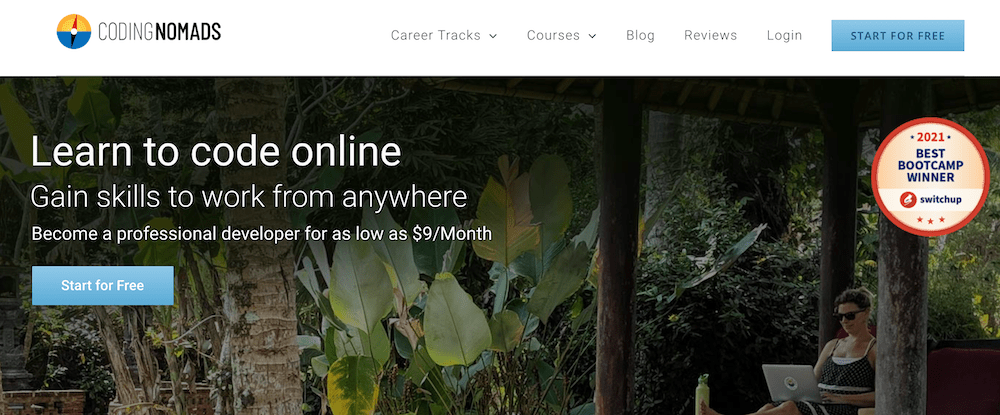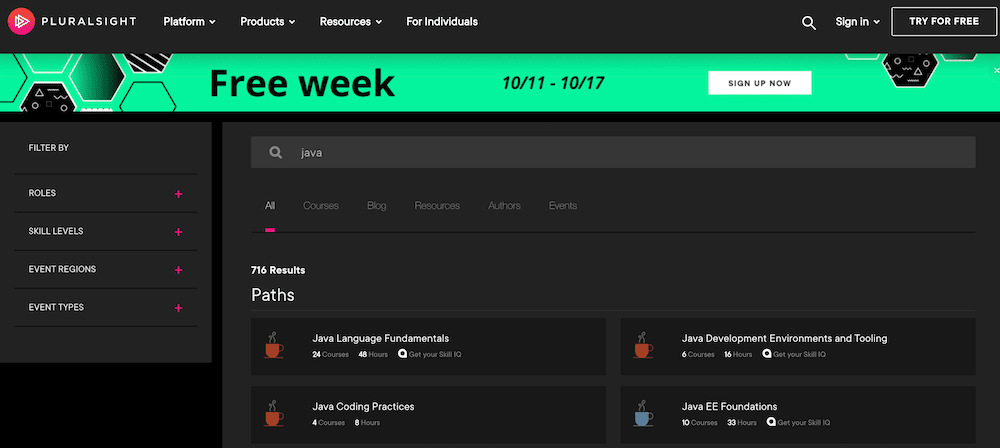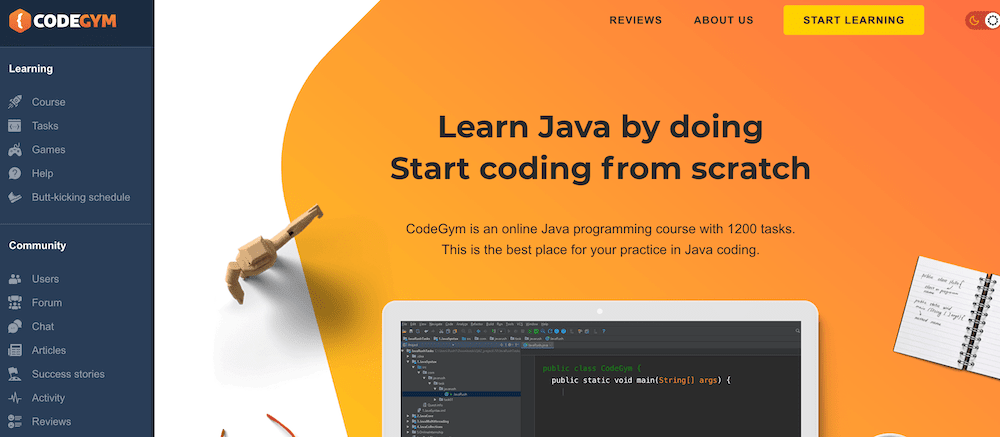Resources
10 min read
Last updated:
If you’ve ever wondered how to learn Java with no programming experience then look no further than our guide.
We’ll take you through some of the best tutorials and tips to get you started on your journey to becoming a Java developer.
The tips and tutorials recommended below are from seasoned engineers and software development professionals so you can count on this guide to be used as both an initial stepping off point for understanding the basics or as a resource to help you brush up on your current knowledge.
Contents
An Introduction To Java As A Programming Language
Our first specialist Andrew Lindberg, Senior Software Development Mentor at Exelaration was happy to share his insights below on the background of Java and how it is being taught to students and used across many enterprises.
“Java is still commonly taught in introductory high school and college computer science curriculum as an introduction to object-oriented programming as well as programming more broadly.”
“Java is an object-oriented, strongly typed language that runs on a virtual machine. Object-oriented means that we organize the code around entities that our program is concerned with, like Person, Invoice, or Location.”
“Strongly typed means that decisions about data structures are made when the code is being written, not when it's being run. The virtual machine means that Java code is relatively portable and can run on any device/platform that already has a virtual machine.”
“It has been around since 1995 and is still one of the most popular languages being used in systems to date.”
“Java's own documentation of the language and the standard library (a suite of tools that come included with the Java development environment) are among the most comprehensive around.”
“This is largely due to being refined and maintained to a high level of quality for an extended lifetime. Many of the publishers that focus on technology and programming language reference books and material also have strong offerings for the Java language, which also have benefited from years of refinement and curation.”
“Java has had an interesting and storied history stretching from Sun Microsystems and Oracle to the open-source movement and Google. It's been the subject of lawsuits and impacted the trajectory of major technologies.”
“Part of this comes from its age and resilience, and some of this is due to Java's unique features and formulation that has enabled such a wide-ranging involvement in many areas of the technology world.”
“Java is used all over the world for various different types of applications including simulations, web services, desktop applications and more. Java has grown to embrace and extended to support an extensive variety of uses over the course of its life.”
“This includes some of the first interactive programs delivered via a web browser, 3D modelling, database manipulation, mobile development and more.”
What Is The Best Way To Go About Learning Java As A First Language?
When you are learning Java or any programming language, getting your environment set up correctly is often the most difficult part. Anyone new to programming faces this challenge, as newbies are unaware that installs fail all the time.
If your installation fails and you have no idea what the error message means, you can Google it. If the error contains a filename and line number, dig in and see if you can solve it.
It is also helpful to build Java code katas that are accessible to make getting started easier. Many of the katas you need to know are available on GitHub for you to view the code.
Finally, and probably most importantly, you should read, code, and repeat. The first resource you should check out is Core Java Volume One. Once you've read it, try to program something or do some katas. Then buy Core Java volume two and study it in your free time while you continue to program.
In addition to these steps, you can network with your peers and other experienced Java developers online to resolve your issues.
Best Java Tutorials & Online Resources For Learning Java
It is common knowledge that there are not enough software engineers to fill open jobs, and this gap continues to widen. Intensive coding boot camps can assist students learning to program, but only 12% teach two of the most in-demand languages - Java and Python (coming up in one of our future blogs). Universities teach these languages, but an average degree takes 4 years, cost $20k+, and doesn't teach the practical skills actually needed for many of today's jobs.
The resources below will help show you how to get started on your journey to mastering Java through online courses.
Udemy
 Udemy was suggested by Martin Kristiansen, founder of Home Studio Ideas who was happy to recommend the specific course that helped him improve his knowledge of Java the most; “A couple of years ago I started my journey of learning programming to kickstart my career as a software developer.”
Udemy was suggested by Martin Kristiansen, founder of Home Studio Ideas who was happy to recommend the specific course that helped him improve his knowledge of Java the most; “A couple of years ago I started my journey of learning programming to kickstart my career as a software developer.”
“The Internet is full of useful resources but I really wanted something in-depth and hands-on. I took an 80 hour course on Udemy which opened a whole new world.”
“I took the course Java Programming Masterclass for Software Developers and it really covered everything. You cannot learn by simply reading books or watching online courses until you start writing code and creating projects and this course had great study material. The topics covered are extensive and the teacher (Tim Buchalka) is very concise and clear.”
Tim's tutorial was seconded by another contributor, Tanner Arnold, President & CEO of Revelation Machinery as one of the best courses for learning Java on Udemy; “In my opinion, Complete Java Masterclass by Tim Buchakla is a great course for learning Java. Tim is a professional instructor with extensive knowledge of Java programming.”
“He addresses the fundamentals of Java, including data types, keywords, operators, statements, expressions, and Object-Oriented Programming, before moving on to SQL and networking concepts.”
“Each Java concept is clarified in a simple and concise manner. The exercises in this video tutorial will put your knowledge to the test. By the end of these Java video tutorials, you'll be able to write clean code using the IntelliJ IDEA IDE.
Udemy was also recommended by Nabil Mounem, Founder of Have Websites who selected Java In-Depth: Become a Complete Java Engineer as his choice of course; “This is a fantastic Udemy course that you can use to practice Java from the ground up.”
“This is a very informative and thorough tutorial, similar to a previous Java course I had taken, and it covers the majority of Java topics a beginner would need to understand, such as variables, processes, classes, arrays, data structures, threads, networking, and so on.”
“One drawback is that the course is mostly a slide-based course with a few programming samples thrown in for good measure. A few more programming samples, ideally using modern software such as JShell, would be highly useful.”
Last but certainly not least in our selection of Udemy courses for learning Java comes from Jeff Cooper, Manager at Messagely; “Java Programming for Complete Beginners — Learn in 250 Steps is a pretty recent Java course on Udemy, and as a result, it is also the most up-to-date.”
“It teaches you how to programme in Java using software like JShell, which was implemented in Java 9. Without a doubt, it's a fantastic platform that makes experimenting with Java a breeze.”
“The course layout is also excellent, with a step-by-step approach to training. Having taken some of the instructor's Spring courses in the past, I like his methodology and teaching style.”
“Java fundamentals, Object-Oriented Programming, Java Collections, Generics, Multithreading and Concurrency, Functional Programming Networking, File Handling, and Exception Handling are all covered in detail in this course.”
Coursera
 Coursera was the tutorial platform of choice when we came to ask Julian Goldie, CEO of Goldie Agency for his recommendation for courses on Java; “Object-Oriented Programming in Java Specialization is for novice software developers who have some programming background with at least one other programming language (e.g., Python, C, JavaScript, etc.) and wish to use object-oriented design with Java to solve more complex problems.”
Coursera was the tutorial platform of choice when we came to ask Julian Goldie, CEO of Goldie Agency for his recommendation for courses on Java; “Object-Oriented Programming in Java Specialization is for novice software developers who have some programming background with at least one other programming language (e.g., Python, C, JavaScript, etc.) and wish to use object-oriented design with Java to solve more complex problems.”
“In addition to learning Java, you'll get hands-on experience with two Java programming environments (BlueJ and Eclipse), as well as learn how to program with graphical user interfaces and build applications that can manage massive volumes of data.”
CodingNomads
 CodingNomads helps students learn the many skills needed for Java development jobs (it is estimated that 50% of their students receive scholarships after having completed their study).
CodingNomads’ grads often go on to build their own products as entrepreneurs, obtain more technical careers, or work as digital nomad freelancers.
CodingNomads helps students learn the many skills needed for Java development jobs (it is estimated that 50% of their students receive scholarships after having completed their study).
CodingNomads’ grads often go on to build their own products as entrepreneurs, obtain more technical careers, or work as digital nomad freelancers.
PluralSight
 PluralSight is well known by many developers for their focus on delivering brilliant technical tutorials that enhance the student’s learning experience. The site delivers highly valuable video content and exercises that’ll greatly assist beginner Java Developers.
The site often provides discounts and free trials periodically so if you can’t currently afford an annual subscription it is well worth waiting for a short time until they are running an offer for new users.
PluralSight is well known by many developers for their focus on delivering brilliant technical tutorials that enhance the student’s learning experience. The site delivers highly valuable video content and exercises that’ll greatly assist beginner Java Developers.
The site often provides discounts and free trials periodically so if you can’t currently afford an annual subscription it is well worth waiting for a short time until they are running an offer for new users.
When it comes to selecting a Pluralsight course for learning Java, Damien Knight , CEO of Workever was happy to contribute his favourite masterclass for beginners; “Learning Path for Java is a complete Java Developer Course. These Java video tutorials are brief and to the point & covers all of the fundamental concepts needed to learn Java at all stages, from beginner to advanced.
“You can learn how to work effectively with Java Enterprise Edition(JEE) concepts such as variables, loops, expressions, and Object-Oriented programming as a beginner.”
“You will be able to build applications on your own by the end of the beginner segment. After you finish the beginner portion, you'll move on to the intermediate level of Java programming, where you'll learn about the Java toolbelt, JDBC, Multithreading, Concurrency, Memory Management, Reflection, and advanced frameworks like Spring.”
Later on, you'll progress to the advanced section, where you'll learn about design trends in Java, including structural, creational, and behavioural patterns, as well as coding best practices and how to test Java code.”
If this Pluralsight course is somewhat overwhelming then you might want to consider Naomi Bishop's (CEO of Surfky) choice for beginners; “Java Fundamentals: The Java Language is a perfect Java course for beginners.”
“The fundamentals of Java, including Class, Object, Data Types, Threads, Directories, Error Handling, and other core Java principles, are presented in this course.”
“In a nutshell, this is a decent course for learning Java from the ground up. It covers the Java programming language and servers in detail, as required for all Java-based development work, such as server-side and client-side development, like Android apps for example.”
Our next specialist, Pradeep Kumar, technical writer at Mindmajix recommended the following two online courses for learning Java development.
CodeGym

“CodeGym is the place to hone your Java development skills. The educational process on the platform is 80% practical. CodeGym also integrates with IntelliJ IDEA using a plugin.”
“This allows you to do your training faster than other platforms I’ve used. As part of the course, you get over 1200 practice tasks to complete. After completing the tasks, you will receive a performance check and grade.”
Java revisited
“Java revisited offers a slightly different approach to learning Java. You get access to tons of hands-on tutorials.” “They train and guide their readers in learning Java programming. So it's more like a mixture of theory and practice. You read the theory and then you apply it.”
“When you've got some hands-on experience, be sure to come back and test it with their quiz.”
“If you have previously studied only from textbooks, the test will measure the difference between theoretical and practical approaches.”
Have any additional tutorials that have helped you learn Java that you can’t see included in this article? Then feel free to suggest your recommendations to [email protected]
If you are planning to launch your next Java backed project soon then you may wish to look at monitoring your new application. A monitoring tool such as the one provided by Logit.io can assist you by providing a centralised reporting and alerting solution.
If you enjoyed this guide of getting started with learning to program then why not check out our guide to APIs versus Microservices for more beginner-friendly content or our guide on Grafana dashboards?
